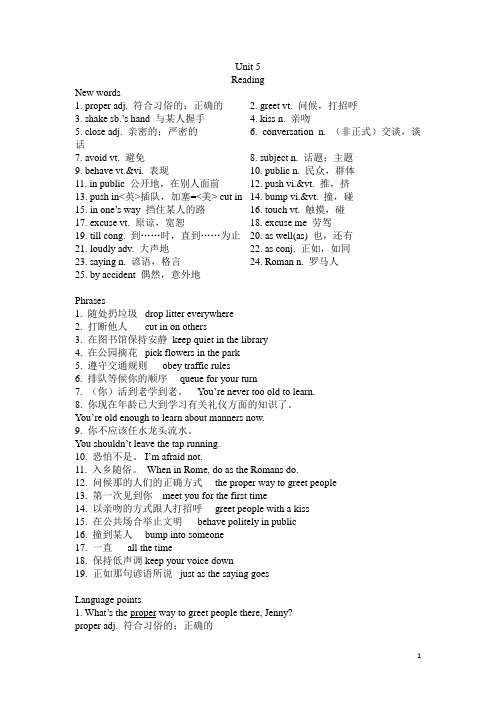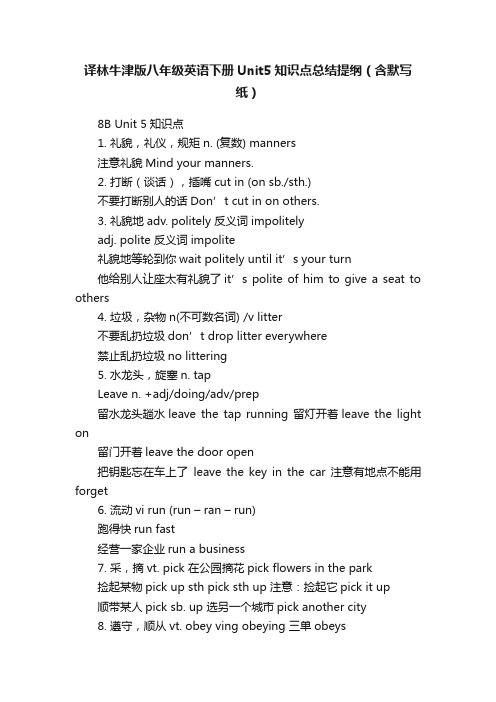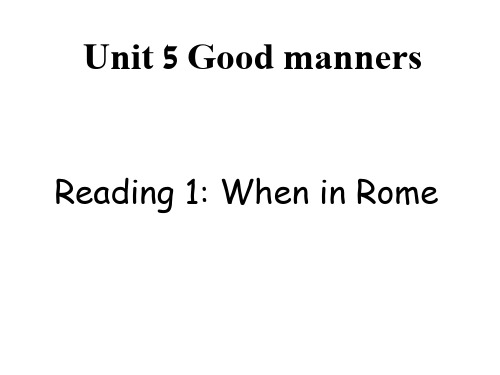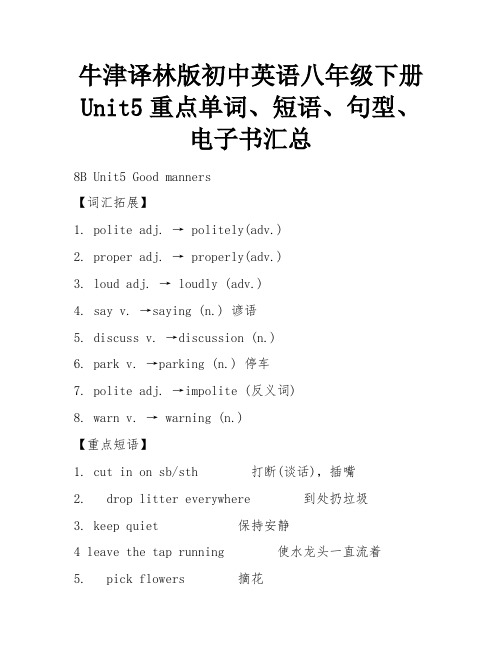译林版八年级下册英语Unit 5 Reading知识点总结梳理
译林版八年级下册英语Unit 5 Reading知识点梳理

Unit 5ReadingNew words1. proper adj. 符合习俗的;正确的2. greet vt. 问候,打招呼3. shake sb.’s hand 与某人握手4. kiss n. 亲吻5. close adj. 亲密的;严密的6. conversation n. (非正式)交谈,谈话7. avoid vt. 避免8. subject n. 话题;主题9. behave vt.&vi. 表现10. public n. 民众,群体11. in public 公开地,在别人面前12. push vi.&vt. 推,挤13. push in<英>插队,加塞=<美> cut in 14. bump vi.&vt. 撞,碰15. in one’s way 挡住某人的路16. touch vt. 触摸,碰17. excuse vt. 原谅,宽恕18. excuse me 劳驾19. till cong. 到……时,直到……为止20. as well(as) 也,还有21. loudly adv. 大声地22. as conj. 正如,如同23. saying n. 谚语,格言24. Roman n. 罗马人25. by accident 偶然,意外地Phrases1. 随处扔垃圾 drop litter everywhere2. 打断他人cut in on others3. 在图书馆保持安静keep quiet in the library4. 在公园摘花pick flowers in the park5. 遵守交通规则obey traffic rules6. 排队等候你的顺序queue for your turn7. (你)活到老学到老。
You’re never too old to learn.8. 你现在年龄已大到学习有关礼仪方面的知识了。
译林牛津版八年级英语下册Unit5知识点总结提纲(含默写纸)

译林牛津版八年级英语下册Unit5知识点总结提纲(含默写纸)8B Unit 5知识点1. 礼貌,礼仪,规矩n. (复数) manners注意礼貌Mind your manners.2. 打断(谈话),插嘴cut in (on sb./sth.)不要打断别人的话Don’t cut in on others.3. 礼貌地adv. politely 反义词impolitelyadj. polite 反义词impolite礼貌地等轮到你wait politely until it’s your turn他给别人让座太有礼貌了it’s polite of him to give a seat to others4. 垃圾,杂物n(不可数名词) /v litter不要乱扔垃圾don’t drop litter everywhere禁止乱扔垃圾no littering5. 水龙头,旋塞n. tapLeave n. +adj/doing/adv/prep留水龙头趟水leave the tap running 留灯开着leave the light on留门开着leave the door open把钥匙忘在车上了leave the key in the car 注意有地点不能用forget6. 流动vi run (run – ran – run)跑得快run fast经营一家企业run a business7. 采,摘vt. pick 在公园摘花pick flowers in the park捡起某物pick up sth pick sth up 注意:捡起它pick it up顺带某人pick sb. up 选另一个城市pick another city8. 遵守,顺从vt. obey ving obeying 三单obeysobey- obeyed- obeyed 反义词disobey 顺从某人做某事obey sb. to do sth遵守交通规则obey traffic rules他顺从老师按时交作业He obeys the teacher to hand in homework on time9.(人、车等)排队等候queue n./vqueuing queued他正排队等车he is queuing for the bus 插队jump the queue10.(轮流的)顺序n. turn v. 变得;转向轮到你擦黑板了It’s your turn to clean the blackboard 轮流做某事take turns to do sth天变热了it’s turning hot 向某人求助turn to sb.打开(电器)turn on 关闭turn off 调高(声音)turn up 调低turn down11. 符合习俗的,正确的adj. proper adv. properly 反义词improperly正确和别人打招呼的方式the proper way to greet others the proper way of greeting others我们应当饮食适当we should eat and drink properly12. 问候,打招呼vt. greet Ving greeting相互问候greet each other英国人经常用亲吻和亲戚打招呼british people often greet relatives with a kiss13. 与某人握手shake sb’s hand Shake v/n = shaking shake- shook – shaken感到轻微的震动feel the slight shake/ shaking 摇摇头shake one’s head 晃动身体shake one’s body 14. 亲吻n./ v. kiss 复数kisses用亲吻互相问候greet each other with a kiss greet each other by kissing15. 亲密的;严密的adj. close- closer- closest v. 关闭close adj. 关着的closedadv. 靠近地close adv. 密切地closely商店星期天关门the shop is closed on Sundays.他是我最亲密的朋友he is my closest friend我住在学校附近I live near (to) my school. I live close to my school.密切地观察珍稀鸟类watch the rare birds closely16.(非正式)交谈,谈话n. conversation (可数)用有关天气的话题开始谈话start a conversation with the subjects about weather17. 避免vt. avoid避免某事avoid sth 避免做某事avoid doing sth请避免年龄体重之类的话题please avoid subjects like age or weight.避免在公共场合吸烟avoid smoking in public18. 话题,主题n. subject (可数)学科,科目你想选修哪门学科which subject would you choose to study?谈论音乐,书,或其他什么话题talk about subjects like music, books or something else.19. 表现vt/vi behave n. behavior (不可数)放规矩点behave yourself 表现礼貌behave politely 多么好的表现what good behavior 20. 民主,群众n / adj 公开的,公共的public公开地,在别人面前in public公众场所请勿大声喧哗don’t talk loudly in public/ in public places21. 推,挤push 插队,加塞push in/ cut in拉,拽pull 向岩石上攀爬pull oneself up插队到别人前面是粗鲁的It’s rude to push in before others他们不会碰到你,或从你旁边推挤过去they will not touch you or push past you.22. 撞,碰vi bump n. 保险杠bumper如果他们撞到某人,他们会说抱歉if they bump into someone, they will say sorry.撞进,撞上crash into (冲击力更强)23. 挡住某人的路in one’s way用这种方法in this way 用不同方法in different ways用另一种方法in a different ways in another way打扰一下,你挡住我的路了excuse me, you are in my way去某地的路上on the/one’s way to 在某种程度上in some ways 无论如何anyway 顺便说下by the way在许多方面in many ways 绝不in no way24. 触摸vt./n touch 复数touches温柔的抚摸gentle touches温柔地抚摸我的狗touch my dog gently触动,感动vt adj. 令人感动的,感人的touching 感动的touched 我被这部感人的电影感动到了。
牛津译林英语八年级下册Unit5Reading (共20张PPT)

UK.
Will
you
chance to say.
4. The group which answers the most
tips correctly and quickly will win the
competition.
Other manners in the UK
Men usually let ladies first in public.
try not to do sth
hit someone or something by accident
In the UK, suppose you are bumped into by a strange man at the underground station,[byʌomup] should still say “ sorry ”, do you think so ?
Help Kitty behave politely in the UK
Rules:
1. You arHe id, ievivdeerdybinotodyfo.uI’rmgrKouitptsy..
2. 3.
EgTihavecehfKirgiNpstrttloyeeouxaanptsseeSsmthuogoanisuvndtleyadanytmtidprIyesuwypasoioslhulmyargosboeuetthsctoetaiptntohs.e?
What is an old saying about Rome? What is the conversation about ?
Jenny
Daniel
What is an old saying about Rome? When in Rome,do as the Romans do. What is the conversation about ? It’s about good manners in the UK.
牛津译林版八年级英语下册Unit5知识点归纳

牛津译林版八年级英语下册Unit5 知识点归纳一、重点短语:1.cut in on sb\sth打断(谈话),插嘴2.shake sb's hand与某人握手2.in one's way挡住某人的路 ugh at嘲笑5.be late for迟到6. say sorry to对...说对不起二、知识点拨1、avoid是及物动间,意为“避免”,后接名词、代词成动名词作宾语。
避免做某事”。
常用:avoid doing“[例句]翻译:你应该避免吃这些不健康的食物。
2、warn“警告,告诫”可作及物动词或不及物动词。
其肯定形式为warn sb to do sth。
否定warn sb not to do sth意为“警告某人不要做某事”,例句:The police warned us not to go out at night. ()[拓展] warn sb about sth意为“提醒某人注意某事;warn sb against (doing) sth意为“告诫某人不要做某事用来连接两个并列成分。
连接两个并列成分作3、both..and..意思是..... ....两者都”,主语时,其后的谓语动词要用复数形式。
如:Both Jim and his brother a re good at swimming.拓展:Neither ;nor....既不...也不;. Either;or.或者....或者....; not only..but also不但..而.... Neither ;nor.和not only..but also连接主语时,谓语动词都遵循就近原则,()1. my father my mother are able to drive a car. So they often take turns to drive me to school.A.Neither ;norB. Both ; andC. Either;orD.Not only ;but also对某人来说)做某事是-的“,其中it是形4、句型"It is+adj.(+for sb)+to do sth."“(式主语,真正的主语是后面的to do sth。
译林版八年级英语下册Unit5 知识点归纳整理

译林版八年级英语下册Unit5 知识点归纳整理译林版八年级英语下册Unit5 知识点归纳整理Unit5 Good maAWelu短语及固定搭配1.drop litter everywhere 乱扔垃圾2.leave the tap running 不关水龙头bey traffic rules 遵守交通规则4.queuur turn 排队等候ub/sth 打断(说话);插嘴ush in/span英=cut in/span美插队,加塞2.句子u’re old enough to learn about maw 你现在足够大了,可以学习礼仪了。
2.You’re nevld to learn活到老学到老B. Reading1.短语及固定搭配way 正确的方式;符合习俗的方式2u第一次见你3.gle with 以……的方式打招呼4.behave politely 表现友好vite sb to do sth 邀请某人做某事ake sb’s hand与某人握手7.avoid sth 避免某事8.avoid doing sth 避免做某事2.句子When in Rome,do as the Romans do 入乡随俗C . Grammara enough to的用法我们可以用该结构来描述一个人的品质和能力1.形容词结构: to be+ adjective + enough+ to dg. He is tall enough to reach the basket 他个子高,可以够到篮筐2.副词结构e.g. Hlowly enough for evunderstand 他说得足够慢,每个人都能听懂3.名词结构e.g. I have enough caat 我有足够多的蛋糕吃b too…to的用法我们可以用该结构表达一种否定的结果1.基本结构: to be +too+ adjectiv e + to dg. I’m too weak to go any further 我太虚弱了,走不动了2.可以再不定时前+介词for 引出逻辑主语e.g. The boxavlittle boy to carry 盒子太重了,这个小男孩搬不动3.当too…to 结构含有否定词时,表示肯定意义e.gvld to learn 活到老,学到老当too后面加表示感情的时,表示肯定意义e.g. Had to hear the bad news 听到这个不幸的消息,他很悲伤。
牛津译林版初中英语八年级下册Unit5重点单词、短语、句型、电子书汇总

牛津译林版初中英语八年级下册Unit5重点单词、短语、句型、电子书汇总8B Unit5 Good manners【词汇拓展】1. polite adj. → politely(adv.)2. proper adj. → properly(adv.)3. loud adj. → loudly (adv.)4. say v. →saying (n.) 谚语5. discuss v. →discussion (n.)6. park v. →parking (n.) 停车7. polite adj. →impolite (反义词)8. warn v. → warning (n.)【重点短语】1. cut in on sb/sth 打断(谈话),插嘴2. drop litter everywhere 到处扔垃圾3. keep quiet 保持安静4 leave the tap running 使水龙头一直流着5. pick flowers 摘花6. obey traffic rules 遵守交通规则7. invite sb to do sth 邀请某人做某事8. keep the library clean 保持图书馆干净9. the proper way to do sth 做某事的恰当方式10. say hello to sb 向某人问好11. for the first time 第一次12. talk about 谈论13. in public 在公共场合14. laugh loudly 大声地笑15. by accident 偶然地,意外地16. greet each other 互相问候17. any time 任何时候;随时18. on one's own 单独19. join the discussion 加入到讨论中20. express oneself clearly 清楚地表达自己21. write down 写下,记下22. be busy with/doing sth 忙于(做)某事23. warn sb of sth 警告某人某事24. keep sb away from danger 使某人远离危险25. no smoking 禁止吸烟26. soon after 不久以后27. in order to 为了28.make one's dream e true 使某人的梦想成为现实29. practise doing sth 练习做某事30. the purpose of ……的目的31.above all 首要的是32. in one's way挡住某人的路【重点句子】1.霍波,你已经够大了,所以你应该学点礼貌。
牛津译林版八年级下Unit5 Reading课件

How to behave at home 1.Are British as polite at home as in public? Yes, they are. 2. How often do they say “please” and “thank you” at home? All the time. 3. Do you have good manners at home?
Important words: proper greet kiss close conversation behave subject bump touch avoid excuse till loudly as saying Roman Important phrases: shake sb’s hand in public push in in one’s way excuse me as well
① ②
Read lines20--26 , then fill in the blanks.
in public 1. Keep your voice down ________. British people don’t like to shout _____ or laugh loudly. ______ 2. What’s the Chinese meaning of the saying “When in Rome, do as the Romans do”? 入乡随俗 ___________
conversation
avoid push in bump
Objectives To get a general understanding about manners in the UK To think about the differences in manners between the UK and China To learn the words and phrases in this interview
初中英语 牛津译林八年级下册 8B unit5 知识点梳理

8B unit5<重点短语>1.drop litter everywhere 到处扔垃圾2.cut in(on sb./sth.)打断(谈话),插嘴3.queue for your turn排队等候你的顺序4.leave the tap running 让水龙头一直开着5.greet sb.with a kiss 和某人用亲吻打招呼6.shake sb.'s hand 与某人握手7.in public 公开地,在别人面前8.push in插队,加塞9.bump into someone撞到某人10.in one's way 挡住某人的路11.as well(as)也,还有12.by accident 偶然,意外地13.join the discussion 参加讨论14.keep sb.from sth.不让某人做某事,使免受。
15.risk losing everything 冒着失去一切的危险16.above all首要的是<重点句型>1.You're old enough to learn about manners now,Hobo.霍波,现在你足够大了,该学礼仪了。
2.You're never too old to learn.活到老,学到老。
3.British people only greet relatives or close friends with a kiss.英国人只和亲戚或亲密的朋友用亲吻打招呼。
4.They talk about the weather,holidays,music,books or something else.他们谈论天气、假期、音乐、书籍或其他一些事情。
5.They think it's rude to push in before others.他们认为在别人前面插队是粗鲁无礼的。
- 1、下载文档前请自行甄别文档内容的完整性,平台不提供额外的编辑、内容补充、找答案等附加服务。
- 2、"仅部分预览"的文档,不可在线预览部分如存在完整性等问题,可反馈申请退款(可完整预览的文档不适用该条件!)。
- 3、如文档侵犯您的权益,请联系客服反馈,我们会尽快为您处理(人工客服工作时间:9:00-18:30)。
Unit 5ReadingNew words1. proper adj. 符合习俗的;正确的2. greet vt. 问候,打招呼3. shake sb.’s hand 与某人握手4. kiss n. 亲吻5. close adj. 亲密的;严密的6. conversation n. (非正式)交谈,谈话7. avoid vt. 避免8. subject n. 话题;主题9. behave vt.&vi. 表现10. public n. 民众,群体11. in public 公开地,在别人面前12. push vi.&vt. 推,挤13. push in<英>插队,加塞=<美> cut in 14. bump vi.&vt. 撞,碰15. in one’s way 挡住某人的路16. touch vt. 触摸,碰17. excuse vt. 原谅,宽恕18. excuse me 劳驾19. till cong. 到……时,直到……为止20. as well(as) 也,还有21. loudly adv. 大声地22. as conj. 正如,如同23. saying n. 谚语,格言24. Roman n. 罗马人25. by accident 偶然,意外地Phrases1. 随处扔垃圾 drop litter everywhere2. 打断他人cut in on others3. 在图书馆保持安静keep quiet in the library4. 在公园摘花pick flowers in the park5. 遵守交通规则obey traffic rules6. 排队等候你的顺序queue for your turn7. (你)活到老学到老。
You’re never too old to learn.8. 你现在年龄已大到学习有关礼仪方面的知识了。
You’re old enough to learn about manners now.9. 你不应该任水龙头流水。
You shouldn’t leave the tap running.10. 恐怕不是。
I’m afraid not.11. 入乡随俗。
When in Rome, do as the Romans do.12. 问候那的人们的正确方式the proper way to greet people13. 第一次见到你meet you for the first time14. 以亲吻的方式跟人打招呼greet people with a kiss15. 在公共场合举止文明behave politely in public16. 撞到某人bump into someone17. 一直all the time18. 保持低声调 keep your voice down19. 正如那句谚语所说just as the saying goesLanguage points1. What’s the proper way to greet people there, Jenny?proper adj. 符合习俗的;正确的e.g. She is always proper in her behaviour. 她的行为总是符合习俗。
2. British people say “hello” or “nice to meet you” and shake your hand when they meet you for the first time.shake one’s hand 与某人握手,相当于shake hands with sb。
e.g. Chinese people usually shake your hand to express their friendliness.中国人通常用握手来表达友好。
You should shake Tony’s hand.=You should shake hands with Tony.3. Do they greet people with a kiss?(1) greet vt. 问候;打招呼,相当于say hello to sb.。
greet somebody with... 以……方式跟人打招呼greet sb with a nod意为“以点头招呼某人”。
greeting 可数名词,意为“问候,致意,祝贺”。
e.g. She greeted us with a smile. 她微笑着跟我们打了个招呼。
(2) kiss n. 亲吻give sb a kiss 意为“吻某人一下;给某人一个亲吻”。
kiss 还可作为及物动词,意为“吻,亲吻”。
e.g. The mother gave her son a kiss and left.He kissed his wife.4. British people only greet relatives or close friends with a kiss .close 此处为形容词,意为“亲密的;严密的”,表示关系或情感上的“亲近”,可作定语或表语。
close to “与.....关系密切”。
e.g. I’m close to my English teacher.close to 还有“离.....近”之意。
e.g. The factory is close to the school.close还可作及物动词,意为“关闭”。
e.g. Please close the window.5. But please avoid subjects like age, weight or money.avoid vt. 避免后面直接跟宾语。
avoid 后常跟v.-ing形式,构成avoid doing sth. 结构,意为“避免做某事”。
e.g. You should avoid eating such unhealthy food.你应避免吃这些不健康的食品。
We must do our homework carefully to avoid mistakes.我们必须认真做作业避免错误。
Mr Wang tried to avoid making his manager angry.王先生设法避免让他的经理生气。
6. Do people there behave politely in public?(1) behave v. 表现e.g. I do not think it’s proper for you to behave so.我认为您这样的举止不合体统。
(2) public 集合名词,意为“民众,大众”。
in public意为“公开地,当众”。
还可作形容词,意为“公共的,公开的”e.g. I don’t like to make a speech in public.a public library 公共图书馆 a public place 公共场所7. They think it’s rude to push in before others.(1) It is+adj.+(for sb)+to do sth.(对某人来说)做某事……句型中的it是形式主语,真正的主语是后面的to do sth。
e.g. It is impolite to ask British people how old they are.问英国人多大年龄是不礼貌的。
(2) push v. 推,挤和push相对应的词是pull,可意为“拉,拖,拔”。
e.g. Don’t push the door. Pull it, please.不要推门。
请拉开。
push in 插队,加塞美国人常用“cut in”8. Also, if they bump into someone in the street, they’ll say “sorry”.bump 此处为不及物动词,意为“碰,撞”,常与介词against,into连用bump into 意为“撞上,偶然碰见”。
bump还可作可数名词,意为“碰,撞击;(因碰撞而引起的)肿块”。
e.g. The car bumped into a tree.He bumped against the door.Just now I bumped into our English teacher.We heard a bump in the next room.9. If you’re in their way, they won’t touch you or push past you.(1) in one’s way 挡住某人的路e.g. I couldn’t walk very fast because a lot of people got in my way.我不能走的很快,因为很多人挡了我的路。
on one’s way (to) 意为“在去.....的路上”。
in the way意为“妨碍,挡道”。
(2) touch vt. 触摸,碰e.g. You can’t touch that thing. 你不能碰那个东西。
Don’t touch the things in the museum.He touched a hot pot and burnt himself.10. They’ll say “excuse me” and be polite enough to wait till you move.(1) excuse me既可以作名词,也可以作动词。
作名词时,可意为“借口”;作动词时,可意为“原谅”。
e.g. Mary explained why she was late, but we didn’t accept her excuse.玛丽解释了为什么他迟到了,但是我们没有接受她的借口。
Please excuse him for arriving late.请原谅他来晚了。
(2) till 此处用做连词,意为“到......时,直到....为止”。
用于肯定句,主句中用延续性动词,指动作或状态持续到till表示的时间为止,意为“直到.....为止”。
用于否定句时,主句中的动词一般是非延续性的,它表示的动作直到till所表示的时间才发生,意为“直到.....(才)”。
e.g. She waited here till you came back.Don’t go away till I come back.till 还可作介词,意为“直到.....为止”,用于肯定句,与延续性动词连用;用于否定句中,与非延续性动词连用,意为“直到......(才)”。
